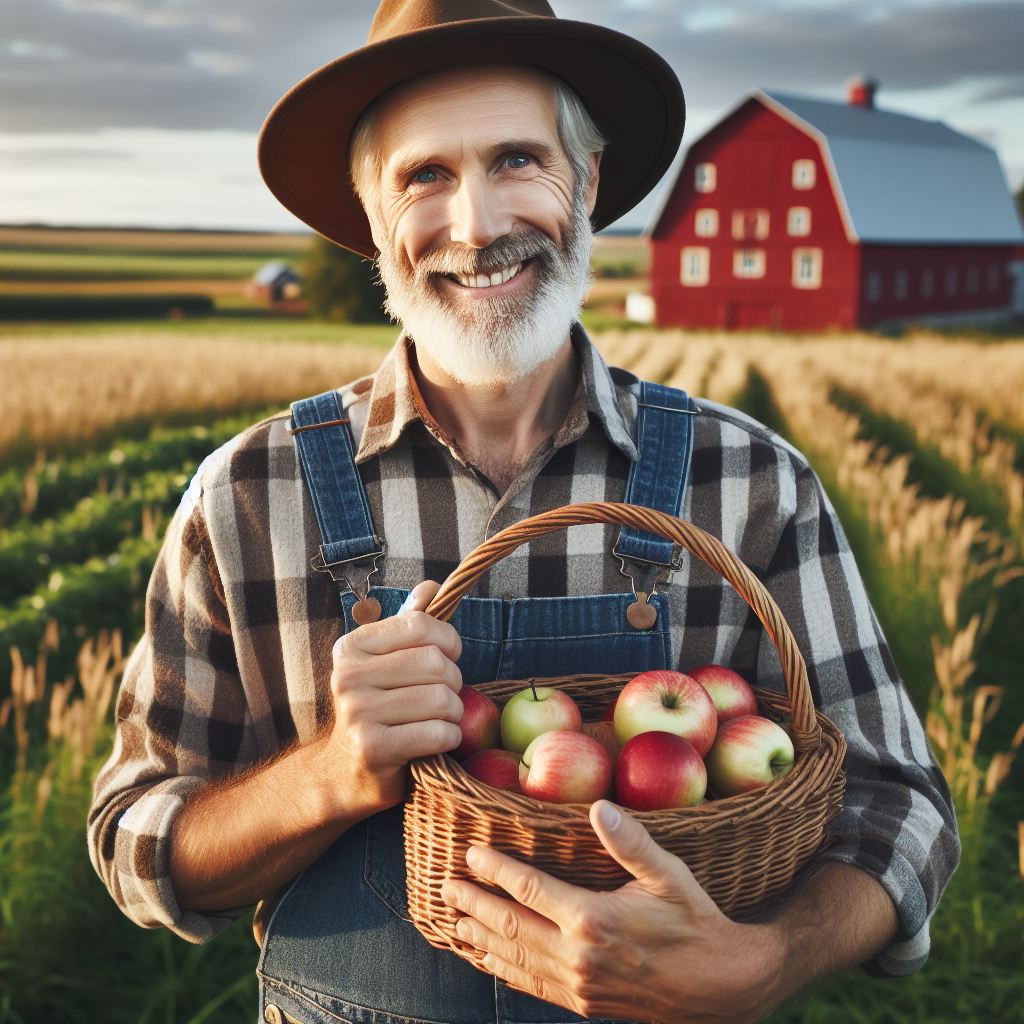Introduction
In today’s blog section, we will explore the concept of organic livestock and the increasing demand for organic products.
We will also discuss the importance of raising animals naturally, without the use of chemicals or antibiotics.
Organic livestock refers to animals that are raised according to specific organic standards, which prohibit the use of synthetic fertilizers, pesticides, and genetically modified organisms in their feed.
This ensures that the animals are raised in a natural and sustainable manner.
There has been a significant increase in the demand for organic products, including meat, dairy, and eggs.
Consumers are becoming more conscious about the quality of the food they consume and the impact it has on their health and the environment.
Organic livestock farming provides a viable solution by offering products that are free from harmful chemicals and additives.
Raising animals naturally is essential for various reasons.
Firstly, it promotes animal welfare as it allows them to roam freely, graze on grass, and engage in natural behaviors.
This leads to healthier and happier animals. Secondly, organic livestock farming helps protect the environment by reducing pollution and enhancing biodiversity.
Lastly, organic products are known to be more nutritious and have a better taste.
In short, organic livestock farming is gaining popularity due to the increasing demand for organic products and the numerous benefits it offers.
Raising animals naturally not only promotes animal welfare and protects the environment but also provides consumers with healthier and tastier options.
Benefits of Organic Livestock Farming
Healthier animals
Organic livestock farming has numerous benefits that outweigh conventional farming methods.
By eliminating the use of antibiotics and growth hormones, animals raised organically are healthier.
Transform Your Agribusiness
Unlock your farm's potential with expert advice tailored to your needs. Get actionable steps that drive real results.
Get StartedThey are not exposed to harmful substances that may affect their growth or overall well-being.
Instead, they are given a natural diet and have access to pasture, allowing them to graze freely and exhibiting their natural behaviors.
Environmental sustainability
In terms of environmental sustainability, organic livestock farming plays a crucial role.
By reducing pollution and greenhouse gas emissions, this farming method helps mitigate climate change.
The focus on promoting biodiversity and ecosystem health also contributes to a healthier environment.
Organic farms often provide habitats for wildlife, supporting various species and maintaining the balance of the ecosystem.
Improved food quality
When it comes to food quality, organic livestock farming excels.
The nutrient content of organic food is generally higher compared to conventionally produced counterparts.
This can be attributed to the organic animals’ natural diet and the absence of artificial additives.
Additionally, organic farming practices ensure that the final food products have reduced pesticide and chemical residues.
Consumers can enjoy food that is free from potentially harmful substances.
Overall, choosing organic livestock farming brings numerous benefits.
It promotes the health and well-being of animals, ensuring that they are raised under natural and ethical conditions.
By embracing environmentally friendly practices, organic farming minimizes pollution and contributes to a more sustainable future.
Additionally, the improvement in food quality guarantees that consumers can enjoy nutritious and safe products.
Organic livestock farming is not just a trend but a responsible approach to agriculture that benefits both animals and the environment.
Read: Seed Selection: Core of Organic Crop Quality
Organic Livestock Farming Practices
When it comes to organic livestock farming, there are certain practices that farmers follow to ensure the animals are raised naturally and in a healthy environment.
These practices focus on organic feed and nutrition, animal welfare standards, and veterinary care and treatment.
Organic feed and nutrition
To maintain the organic status of livestock, farmers avoid using genetically modified organisms (GMOs) in their animal feed.
Genetically modified crops are often sprayed with pesticides and herbicides, which can have negative health effects on animals.
Instead, organic-certified feed and forage are used, ensuring the animals receive a balanced and healthy diet.
Animal welfare standards
Organic livestock farming places great emphasis on animal welfare.
Animals are given access to outdoor spaces and grazing areas, allowing them to engage in natural behaviors and exercise.
Showcase Your Farming Business
Publish your professional farming services profile on our blog for a one-time fee of $200 and reach a dedicated audience of farmers and agribusiness owners.
Publish Your ProfileThis not only improves their physical well-being but also contributes to their mental and emotional health.
Additionally, proper housing and living conditions are provided to ensure the animals are comfortable and safe.
Veterinary care and treatment
In organic livestock farming, preventive measures and natural remedies are prioritized to maintain animal health.
Farmers use natural remedies and holistic approaches, such as herbal treatments and homeopathy, to address common ailments and promote overall well-being.
The use of allopathic medicines, including antibiotics and synthetic drugs, is limited to cases where alternative treatments are not effective or in emergency situations.
This approach helps minimize the reliance on chemicals and ensures the animals are not unnecessarily exposed to antibiotics.
By adhering to these practices, organic livestock farming promotes the overall health and well-being of the animals while minimizing the impact on the environment.
It ensures that the meat, dairy, and other animal products produced are of high quality and free from harmful residues.
Consumers who choose organic products can have the assurance that the animals have been raised naturally, in accordance with strict standards.
Overall, organic livestock farming practices prioritize the animals’ natural needs and encourage sustainable and responsible farming methods.
They provide a more ethical and healthier alternative to conventional livestock farming, benefiting both the animals and consumers who value organic, natural, and environmentally-friendly products.
Read: Harvesting Hope: Stories from Organic Farmers
Certification and Regulations
Organic certification process
In the realm of “Organic Livestock: Raising Animals Naturally,” the journey involves not just ethical care but also adherence to stringent certification and regulations.
To ensure the purity of organic practices, farmers must embark on a well-structured certification process.
Organic Certification Process
- Governmental and Third-Party Organizations: The certification journey starts with choosing a certifying agent. Governmental bodies and third-party organizations play pivotal roles in scrutinizing farming practices
- Compliance with Rigorous Standard: Once the certifying agent is on board, farmers delve into complying with meticulous standards. This involves aligning farming practices with strict organic guidelines to earn the coveted certification.
Labeling Requirements
- Organic Seal and Its Significance: The ultimate goal of certification is the right to display the organic seal. This seal isn’t merely a symbol but a testament to the farm’s commitment to organic principles.
- Ensuring Transparency and Consumer Trust: The organic seal goes beyond aesthetics. It’s a promise of transparency and integrity. Consumers trust this emblem, knowing that the livestock was raised with adherence to nature-friendly practice.
Compliance with Regulations
- Regular Inspections and Audits: The journey doesn’t end with certification. Regular inspections and audits are routine. Agents scrutinize the farm’s ongoing practices, ensuring they consistently meet the high standards set for organic livestock.
- Consequences of Non-Compliance: Straying from the path of organic integrity comes with consequences. Non-compliance may lead to loss of certification, tarnishing the reputation painstakingly built on trust and ethical farming practices.
In the world of organic livestock, every aspect is interconnected.
Raising animals naturally isn’t just a philosophy; it’s a commitment woven into the fabric of a stringent certification process.
Governmental bodies and third-party organizations act as guardians, ensuring farms adhere to the ethical standards essential for organic excellence.
Labeling, especially the prestigious organic seal, is a visible testament to a farm’s dedication.
It signifies more than just a marketing tactic—it’s a beacon of transparency and assurance for consumers seeking ethically raised livestock.
The journey doesn’t conclude with certification. Regular inspections and audits are essential to maintaining organic integrity.
The consequences of non-compliance are severe, underscoring the importance of unwavering commitment to organic practices.
In the intricate landscape of “Organic Livestock: Raising Animals Naturally,” certification and regulations stand as pillars.
They aren’t hurdles but stepping stones, guiding farmers toward a future where livestock coexists harmoniously with nature, ensuring a sustainable and ethical approach to farming.
Read: Eco-Friendly Pest Management in Organic Farms

Challenges in Organic Livestock Farming
Organic livestock farming comes with its fair share of challenges that farmers need to address.
These challenges can impact production costs, disease management, and consumer education.
Higher production costs
Organic livestock farming involves adhering to strict regulations, which lead to higher production costs.
One of the major contributors to these costs is the use of organic feed and certification expenses.
Organic feed, without synthetic additives or genetic modification, can be more expensive than conventional counterparts.
Moreover, obtaining organic certification requires complying with rigorous standards, undergoing inspections, and paying certification fees.
All of these expenses can significantly increase the overall cost of production for organic farmers.
In addition to feed and certification expenses, organic livestock farming also requires greater labor requirements for pasture management.
Organic animals must have access to open pastures and be allowed to graze freely.
This necessitates careful management of pasture areas, rotational grazing, and maintaining the environmental health of grazing lands.
However, managing pastures effectively demands more human labor compared to confining animals in conventional systems. The need for additional labor increases operational costs for organic livestock farmers.
Disease management and prevention
Disease management poses unique challenges in organic livestock farming due to the limited use of medications and vaccines.
In conventional farming, farmers often rely on antibiotics and other medications to treat and prevent diseases.
However, organic principles restrict the use of chemical interventions.
Organic livestock farmers prioritize natural preventive measures, such as providing a balanced diet, proper hygiene, and appropriate housing conditions to enhance animals’ immune systems.
Implementing preventive measures naturally requires intensive planning and careful monitoring.
Showcase Your Farming Business
Publish your professional farming services profile on our blog for a one-time fee of $200 and reach a dedicated audience of farmers and agribusiness owners.
Publish Your ProfileFarmers must pay closer attention to their animals’ health and implement biosecurity measures effectively.
Organic farmers also focus on promoting biodiversity and creating a balanced ecosystem, which can help prevent the spread of diseases.
These natural disease management strategies demand expertise, consistent surveillance, and timely intervention to maintain the health and well-being of organic livestock.
Market and consumer education
One key challenge organic livestock farmers face is overcoming misconceptions about organic farming among consumers.
Some consumers may hold misconceptions regarding the efficacy, safety, or quality of organic products compared to conventional options.
Educating consumers about the benefits of organic farming and addressing these misconceptions is crucial for the success of organic livestock farming.
Farmers need to actively engage in consumer education initiatives and promote transparency to build trust and confidence in organic practices.
Additionally, organic livestock farmers need to educate consumers about the value and benefits of consuming organic products.
This includes highlighting the reduced exposure to harmful chemicals, improved animal welfare, and the positive environmental impact of organic farming.
By educating consumers, farmers can increase consumer demand for organic livestock products and contribute to the growth of the organic market.
In a nutshell, organic livestock farming presents various challenges that need to be addressed by farmers.
Higher production costs, disease management without synthetic interventions, and educating consumers contribute to the complexity of the organic livestock industry.
By understanding these challenges and finding effective solutions, organic farmers can ensure the success and sustainability of their farms while meeting the growing demand for organic products.
Read: Organic Farming Myths vs. Facts: The Truth
Conclusion
In this blog post we discussed some of the benefits of organic livestock farming:
- Organic livestock farming promotes animal welfare and ensures natural behaviors.
- Organic livestock reduces exposure to harmful chemicals, hormones, and antibiotics.
- Organic livestock farming protects ecosystems and maintains biodiversity.
By buying organic products, you support farmers committed to sustainable and ethical practices.
Supporting organic farmers helps to maintain a healthy and balanced environment.
Organic products are of high quality, promoting better health for consumers.
These are some of the Importance of making informed choices for a sustainable future:
- Educate yourself about the benefits of organic farming to make conscious decisions.
- Consider the long-term effects of conventional farming practices on our health and the environment.
- Choose organic products as a step towards a healthier planet and a sustainable future.
Organic livestock farming offers numerous benefits, including animal welfare, reduced exposure to harmful substances, and ecosystem preservation.
Supporting organic products and farmers is crucial for a healthier environment and personal well-being.
Making informed choices about what we consume plays a vital role in shaping a sustainable future.




